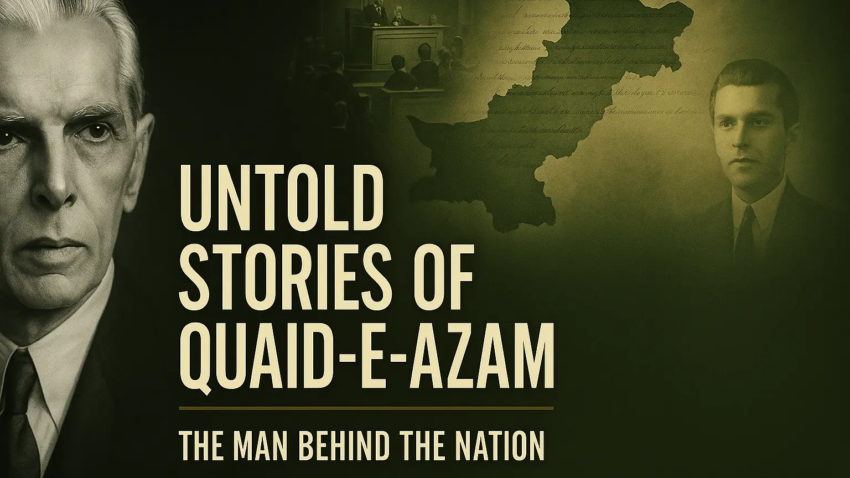
6 Untold Stories of Quaid-e-Azam: What History Forgot to Tell Us
When we think of Quaid-e-Azam Muhammad Ali Jinnah, we picture a stern, sharply dressed man standing firm for Pakistan’s independence. He’s a symbol etched in currency, statues, and schoolbooks. But behind the polished speeches and political victories lies a side of Jinnah that history rarely talks about — the personal battles, private sacrifices, and quieter moments that shaped the man who changed the fate of millions.
This is the story of Quaid-e-Azam not as a founding father, but as a human being — the man behind the title.
The Young Barrister Who Didn’t Belong
Born on December 25, 1876, in Karachi, Jinnah was part of a merchant family of modest means. At 16, he sailed to London to study law. Alone in a foreign land, surrounded by different customs and cultures, Jinnah fought hard to make a place for himself. He wasn’t a natural extrovert. He didn’t have political connections. But he had sharp intelligence and unbreakable discipline.
At Lincoln’s Inn, he earned a law degree in record time — becoming one of the youngest Indians to be called to the Bar. But while Jinnah’s education flourished, his personal life suffered a heartbreaking blow. His mother died while he was in England. He couldn’t return in time. That guilt stayed with him for life, quietly haunting the man who rarely showed emotion in public.
A Voice for Justice in a Divided India
Returning to Bombay, Jinnah began his career as a barrister. He wore finely tailored suits and spoke flawless English — but never forgot his roots. Though he practiced British law, he used it to fight for Indian rights. He once defended a poor servant falsely accused by a British officer and won — a rare outcome in colonial courts.
In the early 1900s, Jinnah joined the Indian National Congress. At the time, he believed in Hindu-Muslim unity. In fact, Gopal Krishna Gokhale, one of India’s senior leaders, called Jinnah “the best ambassador of Hindu-Muslim unity.”
But that unity was fragile. Over time, Jinnah saw how Muslim voices were being sidelined in a growingly Hindu-majority political landscape. What many don’t realize is that Jinnah didn’t leave Congress because of ambition — he left because he felt disrespected, unheard, and politically cornered.
A Tragic Love Story Few Discuss
In 1918, Jinnah married Rattanbai Petit — a 19-year-old Parsi woman from a wealthy family. Their love defied norms and sparked controversy. She converted to Islam, took the name Maryam Jinnah, and distanced herself from her family.
But life with Jinnah wasn’t easy. His long working hours and reserved personality clashed with Rattanbai’s vibrant spirit. She often felt isolated. Just eleven years later, she died of illness at the age of 29.
Jinnah was devastated. He never remarried. He withdrew emotionally and even became estranged from his only daughter, Dina, who chose to marry a Parsi man — a decision that mirrored his own but one he couldn’t accept.
This personal loss hardened him. Colleagues noticed he became quieter, more serious. The man who once enjoyed theater and horse riding was now consumed by a singular purpose: protecting the rights of Muslims in a post-British India.
The Reluctant Politician Who Became a Nation’s Voice
Unlike Gandhi, who thrived in crowds, Jinnah wasn’t a mass mobilizer. He was a constitutionalist, a strategist, and a lawyer at heart. He believed in dialogue, law, and legislative process. But when negotiations with Congress failed repeatedly, and the British began to consider a united India without adequate Muslim safeguards, Jinnah stood up.
His speeches in the 1940s weren’t just political — they were warnings. He foresaw riots, discrimination, and marginalization if Muslims became a permanent minority. It wasn’t just about power. For Jinnah, it was about dignity and safety.
And yet, he wasn’t power-hungry. When Pakistan was formed in 1947, he could have taken any title. But he chose “Governor-General,” not a king or dictator. He moved into a modest residence, refused luxury, and continued to work — even as cancer silently ate away at his health.
The Illness He Hid — And Why
Few know that Jinnah was diagnosed with tuberculosis in the 1930s. He hid it from everyone, even his closest aides. He knew that if his illness became public, it could weaken the Pakistan Movement. He worked through pain, fatigue, and coughing fits — never letting it show in public.
Doctors later revealed that by 1948, Jinnah had only one functioning lung. Yet he continued to work — drafting policies, attending meetings, and guiding the fragile new state through its chaotic birth. When he passed away on September 11, 1948, Pakistan lost more than a leader. It lost its moral compass.
The Legacy Beyond Politics
Today, Jinnah is remembered for founding Pakistan. But his deeper legacy lies in what he stood for — discipline, secular governance, minority rights, and the rule of law. He envisioned Pakistan as a country where people of all faiths could live freely. In his famous 1947 address to the Constituent Assembly, he said:
“You may belong to any religion or caste or creed — that has nothing to do with the business of the state.”
That dream still challenges and inspires the nation today.
Leave a Reply